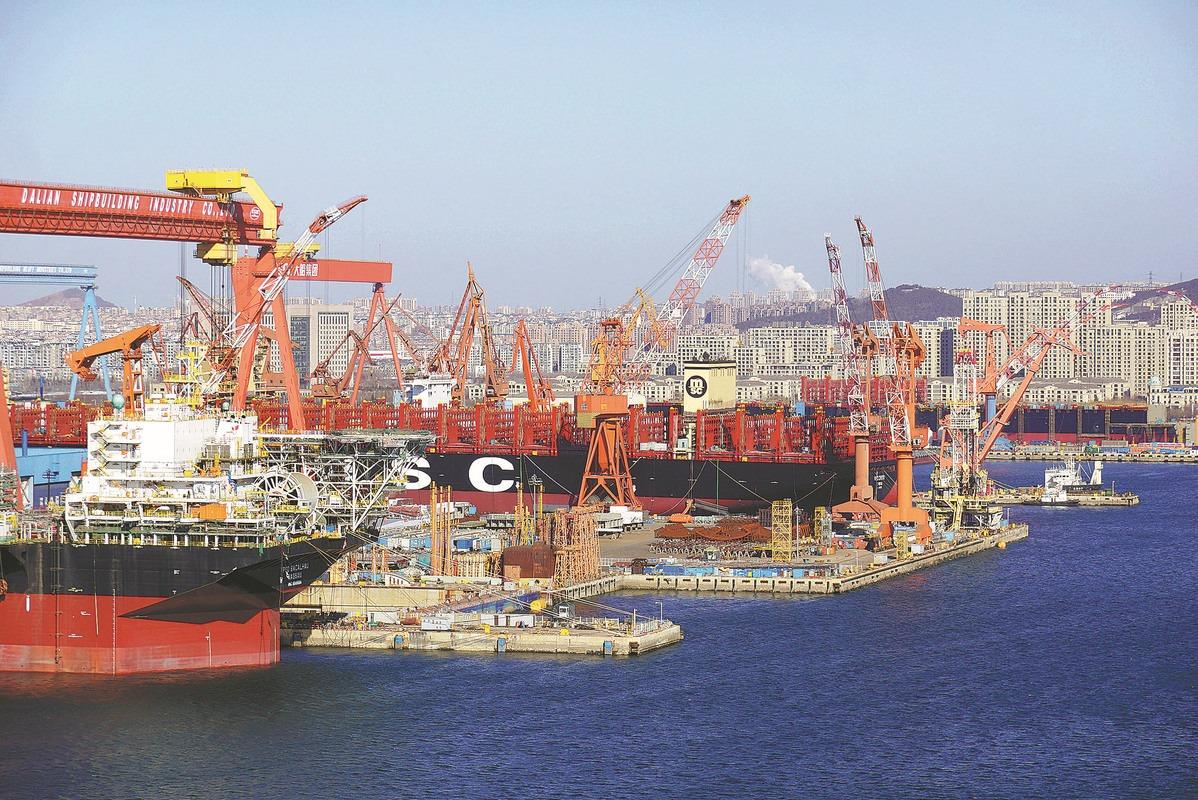- Home
- Billionaires
- Investing Newsletters
- 193CC 1000
- Article Layout 2
- Article Layout 3
- Article Layout 4
- Article Layout 5
- Article Layout 6
- Article Layout 7
- Article Layout 8
- Article Layout 9
- Article Layout 10
- Article Layout 11
- Article Layout 12
- Article Layout 13
- Article Layout 14
- Article Sidebar
- Post Format
- pages
- Archive Layouts
- Post Gallery
- Post Video Background
- Post Review
- Sponsored Post
- Leadership
- Business
- Money
- Small Business
- Innovation
- Shop
Recent Posts
US Investigation Reveals China’s Unfair Dominance in Global Shipbuilding, Setting Stage for Potential Sanctions

A comprehensive U.S. trade investigation has concluded that China employs unfair policies and practices to dominate the global shipbuilding, logistics, and maritime industries, potentially paving the way for significant penalties. The investigation, initiated by U.S. Trade Representative Katherine Tai in April 2024 at the request of United Steelworkers and four other U.S. unions, has uncovered concerning patterns of market manipulation and anti-competitive behavior.
The investigation’s findings, which are expected to be officially released this week before President Biden leaves office on January 20, reveal that China has systematically targeted these sectors through various means, including extensive financial assistance, barriers for foreign companies, forced technology transfers, and intellectual property theft. Perhaps most notably, investigators found that Beijing has artificially suppressed labor costs in these sectors to gain a competitive advantage.
The impact of these practices is starkly evident in the numbers. China’s share in the $150 billion global shipbuilding industry has skyrocketed from a mere 5% in 2000 to over 50% in 2023, largely attributed to government subsidies. Meanwhile, U.S. shipbuilders have seen their market share plummet to less than 1%, highlighting the dramatic shift in global maritime manufacturing capabilities.
The investigation comes at a crucial time, as tensions between the United States and China continue to escalate. The Biden administration has already taken several steps to counter China’s growing influence, including maintaining Trump-era duties and implementing new export controls. This latest development could lead to additional measures, such as tariffs on Chinese-built ships or new port fees.
The findings have garnered support from industry leaders and labor representatives. Scott Paul, president of the American Alliance for Manufacturing, has expressed conviction in the investigation’s conclusions. The report suggests that China’s targeting of these sectors represents the most significant obstacle to revitalizing U.S. industry in these areas.
Recent actions by the U.S. government further underscore the seriousness of the situation. The United States has already added China’s largest shipping company, Cosco Shipping Holdings Co., and two major shipbuilders to its military blacklist. While this blacklist doesn’t impose direct penalties, it serves as a deterrent for U.S. firms considering engagement with these entities.
The investigation’s timing is particularly significant as former President Trump, who has promised to increase tariffs on Chinese goods by 60% if re-elected, has been vocal about America’s need to address China’s dominance in both commercial and military shipbuilding. Trump has suggested that the U.S. might need to rely on allies to help build necessary naval vessels.
Industry experts note that rebuilding America’s once-vibrant shipbuilding and maritime industries will require substantial investment and time, potentially spanning decades and costing hundreds of millions of dollars. They emphasize that tariffs alone may not be sufficient to address the complex challenges facing the industry.
The Chinese Commerce Ministry has responded to the investigation, dismissing it as lacking factual basis and accusing the U.S. of blaming China for its own industrial problems. However, the concerns about China’s shipbuilding practices extend beyond the United States, with Canada and European nations also expressing similar worries about market distortion and unfair competition.
As the Biden administration prepares to release its official findings, the global maritime industry watches closely to see what penalties might be imposed and how they could reshape the international shipbuilding landscape. The outcome of this investigation could mark a significant shift in U.S.-China trade relations and potentially influence the future of global maritime manufacturing.
- Biden administration
- China
- commercial shipping
- competition policy
- economic competition
- Economic Policy
- economic sanctions
- economic security
- global commerce
- Global Economy
- global market share
- global trade
- industrial competitiveness
- Industrial Development
- industrial policy
- industrial practices
- industrial strategy
- industrial subsidies
- Intellectual Property
- international trade
- Katherine Tai
- labor costs
- logistics
- Manufacturing
- manufacturing capacity
- manufacturing policy
- maritime dominance
- Maritime Industry
- maritime infrastructure
- maritime logistics
- maritime policy
- maritime technology
- market access
- Market Competition
- national security
- naval manufacturing
- port fees
- shipbuilding
- shipping industry
- supply chains
- tariffs
- technology transfer
- trade barriers
- trade deficit
- trade enforcement
- trade investigation
- trade penalties
- trade regulation
- trade relations
- trade restrictions
- United States
Recent Posts
Categories
- 193 Countries Consortium Partner1
- 193cc Digital Assets2
- 5G1
- Aerospace & Defense48
- AI37
- Arts3
- Banking & Insurance11
- Big Data3
- Billionaires1,467
- Boats & Planes1
- Business332
- Careers13
- Cars & Bikes79
- CEO Network1
- CFO Network17
- CHRO Network1
- CIO Network1
- Cloud10
- CMO Network18
- Commercial Real Estate7
- Consultant1
- Consumer Tech194
- CxO1
- Cybersecurity73
- Dining1
- Diversity, Equity & Inclusion4
- Education7
- Energy8
- Enterprise Tech29
- Events11
- Fintech1
- Food & Drink2
- Franchises1
- Freelance1
- Future Of Work2
- Games149
- GIG1
- Healthcare79
- Hollywood & Entertainment203
- Houses1
- India’s 1000 Richest1
- Innovation46
- Investing2
- Investing Newsletters4
- Leadership65
- Lifestyle11
- Manufacturing1
- Markets20
- Media327
- Mobile phone1
- Money13
- Personal Finance2
- Policy569
- Real Estate1
- Research6
- Retail1
- Retirement1
- Small Business1
- SportsMoney42
- Style & Beauty1
- Success Income1
- Taxes2
- Travel10
- Uncategorized14
- Vices1
- Watches & Jewelry2
- world's billionaires1,436
- Worlds Richest Self-Made Women2
Related Articles
Atos Surpasses 2024 Liquidity Targets with €2.19 Billion Year-End Position, Marking Strong Financial Recovery
French IT giant Atos SE has announced its estimated liquidity position for...
By 193cc Agency CouncilJanuary 22, 2025Innovative Gaming Meets Sustainability: Cranfield School’s “Game of Life” Wins Prestigious FT Teaching Award
In a significant recognition of innovative educational approaches, Cranfield School of Management...
By 193cc Agency CouncilJanuary 22, 2025Bitcoin Shatters Records, Surges Past $109,000 as Trump’s Inauguration Fuels Crypto Rally
In a historic moment for the cryptocurrency market, Bitcoin reached an unprecedented...
By 193cc Agency CouncilJanuary 20, 2025Billions in Child Trust Funds Remain Unclaimed as Young Adults Miss Out on Financial Windfall
A staggering £1.4 billion in Child Trust Funds (CTFs) remains unclaimed, with...
By 193cc Agency CouncilJanuary 20, 2025















Leave a comment